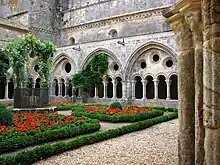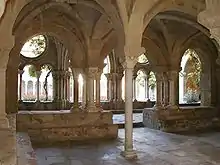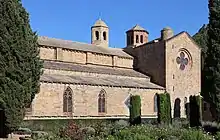Fontfroide Abbey
Fontfroide Abbey (French: Abbaye Sainte-Marie de Fontfroide; Latin: Fons frigidus) is a former Cistercian monastery in France, situated 15 kilometers south-west of Narbonne near to the Spanish border.



It was founded in 1093 by Aimery I, Viscount of Narbonne, but remained poor and obscure, and needed to be re-founded by Ermengarde, Viscountess of Narbonne.[1] In 1144 it affiliated itself to the Cistercian reform movement.[1] Shortly afterwards the Count of Barcelona gave it the land in Spain that was to form the great Catalan monastery of Poblet, of which Fontfroide counts as the mother house, and in 1157 the Viscountess Ermengard of Narbonne granted it a great quantity of land locally, thus securing its wealth and status. The abbey fought together with Pope Innocent III against the heretical doctrine of the Cathars who lived in the region. The Black Death, which reached Narbonne in 1348, decimated almost the entire community.[2][3]
It was dissolved in 1791 in the course of the French Revolution.
It was re-founded in 1858 by monks from Sénanque Abbey. In 1901, because of the French legal changes, the community was driven out of France and went into exile in Spain: the abbey was abandoned.[4] The premises, which are of very great architectural interest, passed into private hands in 1908, when the artists Gustave and Madeleine Fayet d'Andoque bought it to protect the fabric of the buildings from an American collector of sculpture. They restored it over a number of years and used it as a centre for artistic projects.[5]
It still remains in private hands. Today wine is produced here of the AOC Corbières quality under the French appellations system. It also has a small working farm, bookstore and restaurant and takes paying guests.
_-_1910-1911_-_Odilon_Redon.jpg.webp)
Notes
- Berman 2000, p. 131.
- "Une abbaye cistercienne". Abbaye de fontfroide (in French). Retrieved 17 January 2022.
- Larguier, Gilbert (8 April 2014). Le drap et le grain en Languedoc : Narbonne et Narbonnais 1300-1789. Études. Perpignan: Presses universitaires de Perpignan. ISBN 978-2-35412-198-3.
- "Petites histoires d'archives #20 Le couvent assiégé (Carcassonne, 1903)". archivesdepartementales.aude.fr (in French). Les Archives départementales de l’Aude. Retrieved 17 January 2022.
- Mario d'Angelo (ed) La musique à la Belle Époque. Autour du foyer artistique de Gustave Fayet. Paris, Fontfroide, Béziers. Paris: Éditions de Manuscrit, 2013.
- Geipel, Gary (25 January 2013). "A Late Blooming". The Wall Street Journal
References
- Berman, Constance H. (2000). The Cistercian Evolution: The Invention of a Religious Order in Twelfth-Century Europe. University of Pennsylvania Press.